- Home
- Patricia McLinn
A Stranger in the Family (Book 1, Bardville, Wyoming Trilogy)
A Stranger in the Family (Book 1, Bardville, Wyoming Trilogy) Read online
A STRANGER IN THE FAMILY
Patricia McLinn
This edition published by Patricia McLinn
Copyright Patricia McLinn
First published 1995 by Silhouette
New York
The Bardville, Wyoming Trilogy:
A Stranger in the Family
A Stranger to Love
The Rancher Meets His Match
~ ~ ~
VRW HOLT finalist
“An emotionally complex romance of wounded hearts and broken trust that will touch a chord in each reader’s heart.” ~ Romantic Times
~ ~ ~
To my family – never strangers.
~ ~ ~
Dear Readers: If you encounter typos or errors in this book, please send them to me at:
[email protected]
Even with many layers of editing, mistakes can slip through, alas. But, together, we can eradicate the nasty nuisances. Thank you! - Patricia McLinn
TABLE OF CONTENTS
Prologue
Chapter One
Chapter Two
Chapter Three
Chapter Four
Chapter Five
Chapter Six
Chapter Seven
Chapter Eight
Chapter Nine
Chapter Ten
Chapter Eleven
Chapter Twelve
Patricia McLinn books
More about Patricia McLinn’s books
Prologue
“Bodie, there’s somebody wai—”
Bodie Smith didn’t break stride crossing to his office door, the voice of his assistant not quite fast enough to keep up. A thousand details aligned in his head—things he’d see to, people he’d call, decisions he’d make—to keep Bodie Smith Enterprises where he’d put it. On top.
Two steps into his office, all those thoughts vanished.
They were wiped away by the sight of two large, well-broken-in running shoes propped on his desk. Bodie Smith’s eyes traced the rangy figure in a tipped-back chair until they met the assessing gaze of the man who’d been his friend since they’d raced bicycles on pitted North Carolina mountain roads.
“You found something. Cully?”
“You didn’t give me much, Boone.”
Cully Grainger was one of the few people alive who called him Boone. And the only one who recalled the day his younger sister’s childish attempt at his first and middle names—Boone Dorsey—had come out “Bodie.” He was so used to the nickname that his real name sounded odd. And solemn.
“I didn’t give you anything,” Bodie amended.
Cully shrugged. “Wouldn’t go that far. You gave me what Hank let slip—that after his cousin Marlene left North Carolina, supposedly to help out a sick aunt in Nebraska, she had a baby. Your conversation with her confirmed that.”
Conversation was a damn polite word for the tense confrontation he’d had with the high school girlfriend he’d tracked down after not seeing her for nearly seventeen years.
“So I focused on the clue of Marlene’s aunt in Nebraska,” Cully continued. “After a couple of false starts with maiden names and all, I followed that up.”
“You found something.” Boone braced himself.
“Yes.”
“What?” The demand came out harsh. How would he live with himself if something awful had happened, something he could have prevented if he’d been around, if he’d known...
“I found your son.”
Chapter One
“We’ve got a guest coming this afternoon.”
Cambria Weston turned from the kitchen counter, where she’d poured herself coffee, to face Irene Weston, who ate breakfast with the rest of the family at the round wooden table. To trim the temptation of her stepmother’s cooking, Cambria ate her breakfast—toast—at her cabin before she took the three-minute walk to the main house to begin her workday as manager of the Weston Ranch Guest Quarters. It was tough to beat that commute, especially with early May bringing in spring’s warmth and birds and flowers.
Having made her announcement, Irene appeared content to return Cambria’s frown with a mild smile.
“A guest? We’re not open yet. Not until Memorial Day weekend.” Cambria had a detailed schedule of what she had to accomplish each day until then. “That’s three and a half weeks before we open.”
“Officially,” Irene agreed placidly.
“Well, then why didn’t you tell them—”
“Him,” Irene corrected. “One guest. A man.”
“Why didn’t you tell him we aren’t open yet? The cabins reek of paint and the floors haven’t been done, not to mention the scrubbing. And the bunkhouse hasn’t even been opened. We can’t have anybody here yet.”
“He sounded tired,” Irene said, then gave a pleased look around the table loaded with apple nut bread, homemade pancakes, scrambled eggs, bacon and all the fixings of butter, jellies and syrups. “And thin.”
Cambria sat down, meeting the amused smiles her father and brother flashed at her from across the round table. It took something to get the men in her family to take that much time out from enjoying Irene’s bountiful spread.
The men in her family, she thought again with a catch in her heart. Ted Weston’s hair had gone totally silver in the past few years and had grown a little thin on top. Whenever he forgot to wear a hat while he worked in the sun and wind that had long ago corrugated his face and neck, the tender scalp pinkened like a baby’s. In the same few years Pete had nearly reached manhood, gangly adolescence filling in with confidence and character practically before her eyes.
She couldn’t resist a smile back at them. They all knew Irene’s heart was even bigger than her larder. But Cambria took a shot anyhow at adding the salt of practicality, trying to keep her voice stern.
“How can anyone sound thin over the telephone, Mama?”
Mama—that was a tactical error. Cambria had been slipping back and forth between “Irene” and “Mama” since she’d been five years old, a quarter century ago, when Ted Weston had met then married the warm-hearted, ginger-haired young widow. Cambria never used “Mama” when she really meant business.
The older woman’s smile softened as their eyes met.
“He sounded thin,” Irene repeated.
“Weak?” Cambria asked.
“Oh, no, not weak. Not at all. Maybe...stressed. Isn’t that what you and Jessa said when you moved back from Washington and she came along to open the shop?”
Yeah, that’s what she and her long-time friend, Jessa Tarrant, had decided to tell her family and everyone else by way of explanation. Their separate reasons were more complicated and less easily revealed.
Cambria sighed in capitulation, drawing another pair of grins from the Weston men.
“All right, I’ll give the west cabin a once-over this morning. It’s in better shape than the others. It should do for—how long did this guy say he wants to stay?”
“He didn’t say. A couple days, I’d suppose.”
Irene’s inattention to such practical details as finding out how long guests would stay or making sure they paid before they left was the reason Cambria handled the business side of the bed and breakfast.
“Well, don’t be surprised if he walks away saying it’s not worth paying for.”
“We’ll get the cabin ready together,” Irene said. “Everything will be just fine, you’ll see. You worry too much.”
“Or worse,” Cambria said, pursuing her own line of thought. “He’ll stay a couple nights, then, when it’s time to pay, he’ll say the facilities weren’t up to
par and he’ll try to get out of paying.”
“I wish you weren’t so cynical, Cambria.” Cambria felt a twinge of discomfort at the concern in her stepmother’s blue eyes. But that didn’t make her buy the reassurance of the words that followed. “Everything will be just fine.”
* * * *
Shortly before four o’clock, Cambria heard car tires on the road that wound from the highway to the ranch buildings. They had the cabin about as well pulled together as they could, considering the limited time.
Open windows helped dispel the fresh-paint smell, but at the cost of a definite chill. The wooden floor was scrubbed and waxed, though to her critical eye it could have used another coat. The wooden table and chair were also polished, the fireplace cleaned and a new fire laid. The tiny bathroom had been disinfected within an inch of its life, the stuffed chair aired and vacuumed, the shelves dusted. They’d washed the sheets, but without enough time to adequately air the other bed linens, she’d used two quilts from the main house.
Irene was at the house preparing the usual welcoming plate of oatmeal-raisin cookies, while Cambria made the bed. That’s when she heard the car reach the gravel on this end of the drive. Which reminded her—she needed to get a load of gravel to smooth over the ravages of a Wyoming winter before the guests came. The regular season guests, anyway, since this one had already arrived.
She let the top sheet drift down as she looked out the window. A glossy, midnight blue sedan with Wyoming plates pulled to a stop. A rental, definitely not economy class, she judged from two summers’ experience of running the guest quarters. Her left eyebrow rose as she got a better look—definitely not economy class.
Mostly their visitors were family groups, with a few young couples, some retired folks. This car didn’t fit any of those types.
She should have pressed Irene about their guest. Not that it would have done any good. Irene might ask his favorite meal so she could cook it for him, but the chances she’d ask the questions Cambria wanted answered were a thousand to one.
The car door opened and one long, jeans-clad leg appeared. Cambria supposed she should go greet the guest. She’d never cared for being sociable on demand when she’d worked in Washington, and returning to the ranch hadn’t changed that. Being warm and welcoming came easily to some people. Not to her.
Then she heard a voice—Irene—and gratefully continued with the bed. With Irene on hand, Cambria had no need to play gracious hostess.
She was aware of footsteps on the cabin’s wooden porch, the opening of the main door and a murmur of voices, but she paid no attention, concentrating on her task. Spreading and tucking, spreading and tucking. She slid the second pillow into a case, tossed it in place, considered the effect, then stretched to plump its brethren on the far side of the bed.
She began to straighten, the action accelerated by an arrogant, low drawl from behind her—where its owner would have an excellent view of her derriere as she’d bent over the bed.
“Do you come with the room?”
She spun around, momentum advancing her a step so she almost crashed into the solid, male figure. He automatically reached to steady her and she just as automatically withdrew. But her gaze did crash into his—leaving her feeling as if she’d been run over by a pair of gray eyes. Gray eyes that seemed both depthless and flat under a pair of startlingly black eyebrows. She stared into those eyes with the sort of haunting familiarity of deja vu.
In that instant, chagrin spread across the man’s face. Whether it was at his own rudeness or because he was smart enough to see he’d riled her, Cambria didn’t know. And didn’t care.
“Sorry. I didn’t expect to find anybody in here,” he said, the drawl not as pronounced. “But that was out of—”
“We try to meet our guests’ expectations.” Recovering rapidly, she cut across his apology with a smile so icy she thought it might crack her lips. “So I’ll leave right now, Mr.—”
It would have been a good exit line if she hadn’t realized too late that she didn’t know the guest’s name.
“Name’s Boone Dorsey,” he said slowly.
“Mr. Dorsey,” she repeated, then walked past him and out of the room, out of the cabin.
* * * *
“You can call me Boone.”
Cambria jerked her head up at the casual words, spoken as if an hour hadn’t passed since their previous exchange. As if he hadn’t tracked her down to the barn where she was grooming Jezebel and Snakebit. As if he didn’t have to address her across Snakebit’s broad back.
And as if she didn’t hold a very sharp hoof pick.
He’d entered through the open double doors on the east end of the barn. The evening sun, streaming low through the matching doors at the opposite end, so washed him in light that he barely seemed real. She waited, not certain of his motives or his sincerity.
“Or,” he went on in a drawl she realized owed more to the South than the West, “you can call me jackass.”
He took a step forward, out of the dazzle but not so far that the shadows swallowed him. Now she could see one side of his mouth lifted in a half grin of self-derision, grooves echoing up his left cheek. She could see threads of gray that softened the hair that sprang back from his forehead and reached his collar to a lighter shade than the harsh black of his strong eyebrows.
She could also see the tiredness around and behind his black-lashed gray eyes. And, yes—Irene had been right, of course—she could see a thinness in his face that went beyond a natural angularity.
She let out a quick breath. Why did she have the feeling that staying angry at this man would be safer, even as her anger slid away?
Buying time, she brushed Snakebit’s back with her fingertips, then stroked the coarse, smooth hide.
“Jackass has a nice ring to it.”
The other side of his mouth caught up, lifting into a full grin. Another skitter of...something—was it familiarity? instinct warning her to beware?—scratched at her nerves, then disappeared.
“Look, we got off on the wrong foot, and that was my fault. I really am sorry,” he said. “You caught me off guard. Irene didn’t tell me anybody was in the room. And I had a situation where there was a good-looking woman in my room I didn’t expect... Not that there’s any good cause for me to have talked to you that way. Can I make it up to you?”
It was no surprise that he already called her stepmother Irene. But there were several items of interest in his speech. Belatedly she recognized that his leer might have been, at least partly, defensiveness at being caught off guard. And what sort of situation had he been in that a woman had unexpectedly shown up in his room? But foremost, there was his offer.
It might be interesting to see where talk took them. She’d often marveled at the willingness of guests to volunteer information, from mundane chatter about family and jobs to the most intimate details of sex lives and phobias.
“You know horses?” Cambria asked.
A glint lit his eyes. “I know some people I’d describe as their rear ends. In addition to me, naturally. That what you mean?”
She fought an answering smile. “Not quite. I meant, caring for the four-legged kind.”
He sighed, drawing her attention to the broad shoulders in his dazzling white shirt, whose perfect fit announced that it, like the rental car, was not economy class. “I was afraid the apology wouldn’t be enough. You’re going to make me clean out stalls, too, huh?”
She laughed, and meant it despite herself. “I won’t go that hard on you. How about combing Jezebel—” she nodded to the mare behind her “—while I finish with Snakebit’s hooves.”
“Sounds fair to me.”
He took the brush she held out over Snakebit’s back, placing his hand on the gelding’s hindquarters as he came around behind. At least he knew enough to give a horse that warning.
Still, she watched for a moment as he worked on Jezebel, satisfying herself that he knew what he was doing. He raised an eyebrow but didn’t object to
her scrutiny.
Finally she turned back to Snakebit, lifting his front near hoof and bending to remove any packed-in dirt or grit.
“So, Irene tells me you don’t usually open for another month or so,” he offered after several minutes of silent work.
“That’s right. We have a lot of preparation to do before we’re ready for guests.” She wasn’t about to come out and make excuses, but...
“The cabin looks great to me.”
“It smells of paint.” Now why did she say that when she’d decided not to make excuses?
“Small price to pay for privacy.” Was privacy so precious to him? She didn’t have a chance to wonder long, as he went on. “Irene also tells me your name’s Cambria. Cambria—that’s a pretty name. Unusual.”
“Did Irene also tell you the name comes from a deserted coal-mining community?”
“Yeah, Irene told me that. Doesn’t change that it’s pretty.”
Ignoring the second part, she asked dryly, “Anything else Irene told you?”
“Yes. She said you’re the brains of the outfit. I’m wondering if you’re the brawn, too. All this preparation for the guests, you do it alone?”
“No, of course not. The whole family works.”
“Family,” he repeated in a murmur.
She glanced over her shoulder, but he was bent, stroking down Jezebel’s hindquarter. That posture probably explained the odd note in his voice.
“Irene, me, Pete—that’s my brother—and Dad, when he can spare time from the cattle operation. It’s a smaller operation than it used to be, but it’s a lot for one man.”
“Does, uh, your brother help with that, too? I mean, if he’s old enough.”
She chuckled. “He’d probably tell you he’s old enough to do anything and everything. He does help a lot, and he’d do more if Dad and Irene let him, but they’re determined that he have a chance to do things at school, too. He was in a play over the winter and now he’s playing baseball.”

_preview.jpg) Almost a Bride (Wyoming Wildflowers Book 1)
Almost a Bride (Wyoming Wildflowers Book 1)_preview.jpg) Prelude to a Wedding (The Wedding Series Book 1)
Prelude to a Wedding (The Wedding Series Book 1)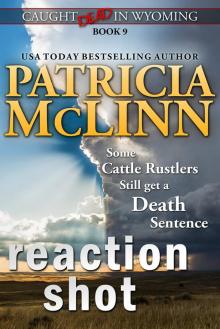 Reaction Shot (Caught Dead in Wyoming, Book 9)
Reaction Shot (Caught Dead in Wyoming, Book 9)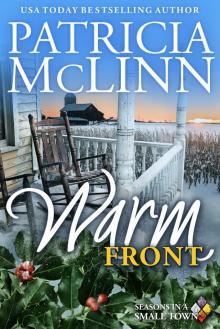 Warm Front
Warm Front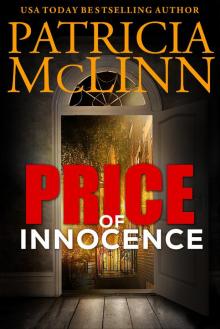 Price of Innocence
Price of Innocence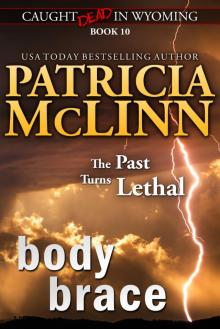 Body Brace (Caught Dead in Wyoming, Book 10)
Body Brace (Caught Dead in Wyoming, Book 10) Death on Covert Circle
Death on Covert Circle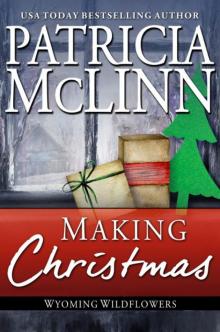 Making Christmas
Making Christmas Death on Torrid Ave.
Death on Torrid Ave. Death on the Diversion
Death on the Diversion The Rancher Meets His Match
The Rancher Meets His Match Widow Woman
Widow Woman The Runaway Bride
The Runaway Bride Hoops
Hoops A Stranger in the Family (Book 1, Bardville, Wyoming Trilogy)
A Stranger in the Family (Book 1, Bardville, Wyoming Trilogy)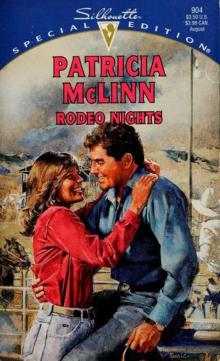 Rodeo Nights
Rodeo Nights Wedding Series Boxed Set (3 Books in 1) (The Wedding Series)
Wedding Series Boxed Set (3 Books in 1) (The Wedding Series)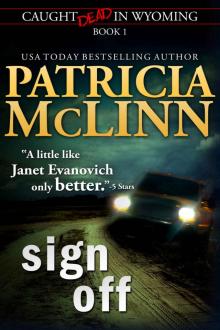 Sign Off (Caught Dead in Wyoming, Book 1)
Sign Off (Caught Dead in Wyoming, Book 1) Prelude to a Wedding
Prelude to a Wedding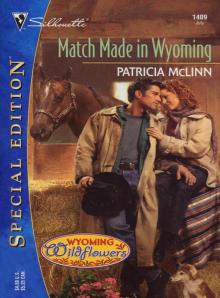 MATCH MADE IN WYOMING
MATCH MADE IN WYOMING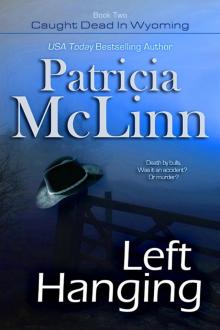 Left Hanging
Left Hanging What Are Friends For?
What Are Friends For?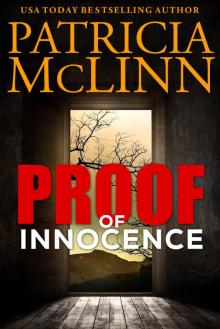 Proof of Innocence
Proof of Innocence Hidden in a Heartbeat (A Place Called Home, Book 3)
Hidden in a Heartbeat (A Place Called Home, Book 3) Baby Blues and Wedding Bells
Baby Blues and Wedding Bells Least Likely Wedding?
Least Likely Wedding? Heart Stealers
Heart Stealers Grady's Wedding
Grady's Wedding Right Brother
Right Brother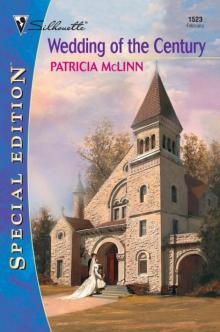 Wedding of the Century
Wedding of the Century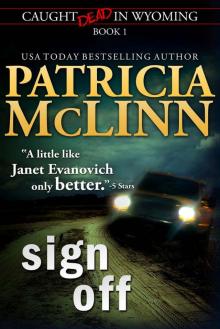 Sign Off
Sign Off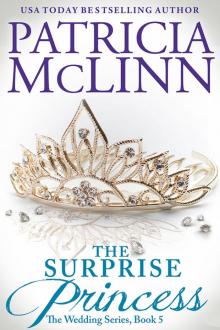 The Surprise Princess
The Surprise Princess Wyoming Wildflowers: The Beginning
Wyoming Wildflowers: The Beginning